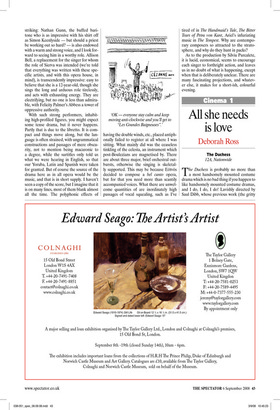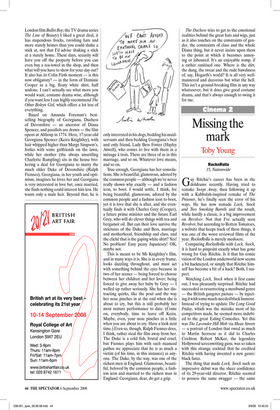All she needs is love
Deborah Ross
The Duchess 12A, Nationwide
The Duchess is probably no more than a most handsomely mounted costume drama which is no bad thing if you happen to like handsomely mounted costume dramas, and I do, I do, I do! Lavishly directed by Saul Dibb, whose previous work (the gritty London film Bullet Boy; the TV drama series The Line of Beauty) I liked a great deal, it has stupendous frocks, ravishing hats and more stately homes than you could shake a stick at, not that I’d advise shaking a stick at a stately home. These days, security will have you off the property before you can even buy a tea-towel in the shop, and then what will you have to show for your day out? It also has its Colin Firth moment — is this now obligatory? — in the form of Dominic Cooper in a big, floaty white shirt, half undone. I can’t actually see what more you would want, costume drama wise, although if you want less I can highly recommend The Other Boleyn Girl, which offers a lot less of everything.
Based on Amanda Foreman’s bestselling biography of Georgiana, Duchess of Devonshire — an ancestor of Diana Spencer, and parallels are drawn — the film opens at Althorp in 1774. Here, 17-year-old Georgiana Spencer (Keira Knightley), with hair whipped higher than Marge Simpson’s, frolics with some girlfriends on the lawn, while her mother (the always unsettling Charlotte Rampling) sits in the house brokering a deal for Georgiana to marry the much older Duke of Devonshire (Ralph Fiennes). Georgiana, in her youth and optimism, imagines he loves her and Georgiana is very interested in love but, once married, she finds nothing could interest him less. He wants only a male heir. Beyond that, he is only interested in his dogs, bedding his maidservants and then bedding Georgiana’s best and only friend, Lady Bess Foster (Hayley Atwell), who comes to live with them in a ménage à trois. There are three of us in this marriage, and so on. Whatever love means, and so on.
True enough, Georgiana has her consolations. She is beautiful, glamorous, adored by the common people — although we’re never really shown why exactly — and a fashion icon, to boot. I would settle, I think, for being beautiful, glamorous, adored by the common people and a fashion icon to boot, yet it is love that she is after, and she eventually finds it with Charles Grey (Cooper), a future prime minister and the future Earl Grey, who will do clever things with tea and bergamot oil. But can their love survive the strictures of the Duke and Bess, marriage and motherhood, friendship and class, and the cliché that is the gaping white shirt? Yes! No problem! Easy peasy Japanesey! OK, maybe not.
This is meant to be Ms Knightley’s film, and in many ways it is. She is in every frame, looks dazzling throughout, and must act with something behind the eyes because in two of her scenes — being forced to choose between her children and her lover; being forced to give away her baby by Grey — I welled up rather seriously. She has her distracting quirks, like the pout and the way her nose pinches in at the end when she is about to cry, but this is still probably her most mature performance to date. (Come on, everybody, time to leave off Keira. Maybe, even, your nose pinches in a little when you are about to cry. Have a look next time.) Even so, though, Ralph Fiennes does, I think, rather steal the film away from her. The Duke is a cold fish, brutal and cruel, but Fiennes plays him with such nuanced pathos we appreciate that he is as much a victim (of his time, in this instance) as anyone. The Duke, by the way, was one of the richest men in England. Glamorous, beautiful, beloved by the common people, a fashion icon and married to the richest man in England. Georgiana, dear, do get a grip. The Duchess tries to get to the emotional realities behind the great hats and wigs, just as it also touches on the constraints of gender, the constraints of class and the whole Diana thing, but it never insists upon them to the point at which it becomes annoying or laboured. It’s an enjoyable romp, if a rather sanitised one. Where is the dirt, the dung, the sweat and the rude bawdiness of, say, Hogarth’s world? It is all very wellmannered and decorous but what the hell. This isn’t a ground-breaking film in any way whatsoever, but it does give good costume drama, and that’s always enough to swing it for me.



































































 Previous page
Previous page